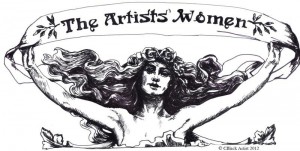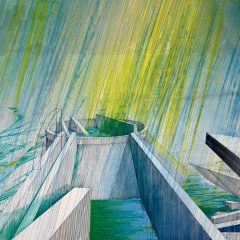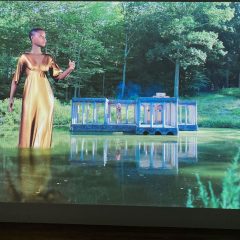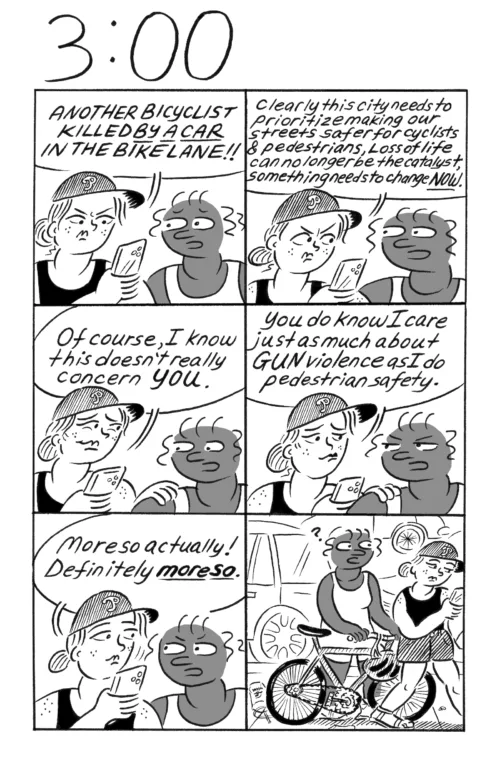As any student of art history knows, many great male artists had more than one woman in their lives – and not just because of sexual extra-curriculars. “The Artists’ Women,” (last performances today, September 16th at the Philadelphia Art Alliance) brings alive the idea of woman as Muse (L’Egerie), exploring the lives of the women who were entangled, artistically and otherwise, with the likes of Fra Filippo Lippi, Duchamp, Picasso and Dali.
The central character in this world-premiere script from University of the Arts theater grad and YeuxVeuxBelle Collective co-founder Annie Such is sculptor Camille Claudel (Shannon Remley). Claudel, entwined with Auguste Rodin, melds her own promising career with the master’s as they collaborate on his “Gates of Hell.” The two live in a web of passion, jealousy (both sexual and artistic), and inspiration, until Claudel’s sense of identity becomes so bound up with Rodin that she can’t tell who sculpted what, and spirals into apparent madness. Committed against her will (and, apparently, her doctors’, too) to an institution for the last thirty years of her life, the artist continued to sculpt work that remains important historically today.
In a story that is not so much linear narrative as imagined, historically-based vignettes, other stories involve Claude Monet’s wife, Salvador Dali’s wife, and Pablo Picasso’s mistress. Pamela Dollak is Cami Doncieux, painted on her deathbed by her husband Monet. Ellie Ruttenberg plays Dora Maar, mistress of Picasso (Sam Nagel). Maar’s talents in photography become subjugated to her lover’s powers in paint as he creates “Guernica.” Gala Dali (Maria Wolf) seethes with poisonous jealousy as Dali’s wife, and in Such’s telling, Will Thompson’s Fra Filippo Lippi falls head over heels for Lucrezia Buti (Gracie Martin), a teenage postulant who poses for him.
Meanwhile, Marcel Duchamp, appearing as his female alter-ego, Rose Selavy (Brendan Norton), is both tortured and elated by the art world’s response to his readymades: “It was a urinal and a desecrated icon that made them love me! They slapped a price on it, and it became art,” Duchamp yells, in one of many lines in the script that seem absolutely true and that artists may find trite.
In Such’s play, artists from Claudel to Picasso work in a compulsive fever of creative agony, bellowing curses as they fling paint and pummel clay. All this passion and jealousy calls for monologues — lots and lots of monologues.
“Genius is as much a curse as it a blessing,” Rodin declares.
L’Egerie (Brittany Kvitko) — the muse embodied — hovers over it all. “Spark,” she breathes, unseen, into the artists’ ears. By turns tender and inscrutable, generous and jealous, practical and sensuous L’Egerie is also easily infuriated (and abused in turn, as she and the artists alike rage over pieces gone awry). “I impregnate you with my radiance, and still you cannot capture me!” she shrieks at Rodin.
L’Egerie is locked in a tacit, tenuous rapport with the artists’ women, despite their ineffable jealousy. While she can inspire the art, “I cannot give him gravity,” she intones to the women. “Even splendor needs grounding. You are ground.”
Director Jeff Hyman is a fluid choreographer of the large cast – characters congregate and disappear like the ebbing and flowing of the tide. Radha Vakharia’s set, sketched with a ladder and a few stools and easels, culminates in a large fabric backdrop, which the characters enter and exit through cleanly overlapping pieces – as if they themselves are materializing from or fleeing into a giant canvas. Starkly effective lighting design by Richard Zettlemoyer casts mythic shadows.
And the cast brims with as much physical and emotional passion as the script. Such packs the play with sensual imagery and ripe, time-honored artistic dilemmas, and she also contributes a digital slideshow, projected on the set’s backdrop, which peppers the stage with images of the characters’ most famous art.
The artists’ women suffer the sublime pain of coming second to their lovers’ genius, or watching their own talents consumed by a male-dominated world, where they’ll be remembered by history not for what they did, but for who they loved. But there are compensations. “He may have created the painting, but I gave him the reason,” says Gala Dali.
At close to three hours (despite its advertised two-hour runtime), the show treads heavily towards its end, and its monologs grow repetitive. But this new acquaintance with the artists, their long-suffering lovers, and the imagined muse behind it all will leave you wanting to revisit the masterpieces themselves.
YeuxVeuxBelle Collective’s “The Artists’ Women,” runs through September 16th (11am and 4:30pm) at the Philadelphia Art Alliance as part of the Philly Fringe Festival. For tickets, visit the Fringe Festival website.










